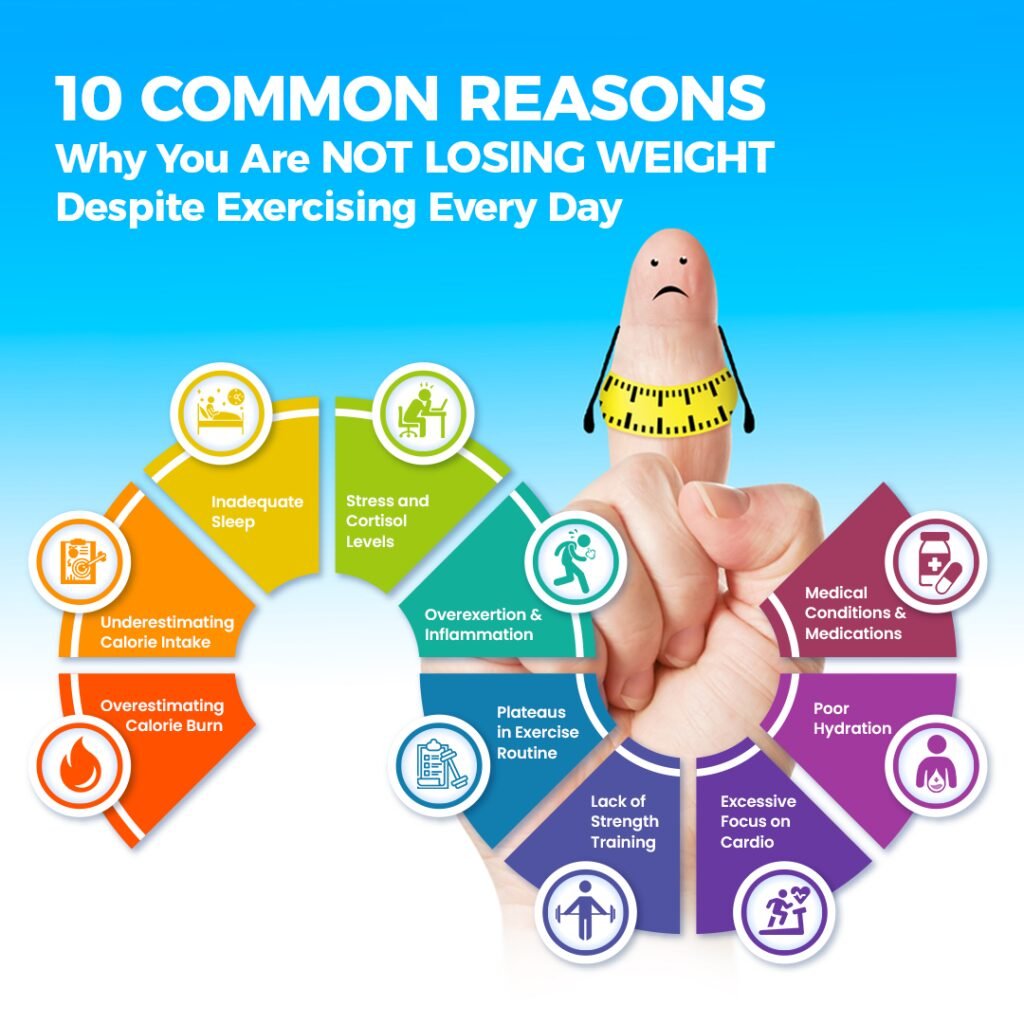
You tirelessly exercise every day, break a gallon of sweat, and give your 100% in your workout routine. And then you step on the weighing machine, only to realize the numbers haven’t budged.
Frustrating right?
Seeing the results you expect despite consistent hard work can be disheartening. However, you aren’t alone; many individuals experience this same struggle and wonder “Why am I not losing weight!?”
So, what exactly are you doing wrong?
Well, in this blog we have discussed the possible reasons why your weight loss journey might be hitting a roadblock.
Interested? Let’s get scrolling.
Diet and exercise are two main issues that you must address when you embark on a weight loss quest. And this is where a lot of lies and misconceptions mix.
So, to get started, let's examine the basic ideas of weight loss and the vital function exercise plays in this process.

Let’s learn about the basic principles of weight loss so that you have a clear and solid foundation to start with.
Caloric deficit is a basic weight loss principle – burning more calories than you consume. Regardless of your diet or exercise regimen, creating a calorie deficit is important. This can be achieved by reducing caloric intake, increasing physical activity, or by a combination of both.
The body's metabolism is the process of converting food into energy and is a key player in weight management. Factors like age, gender, genetics, and muscle mass influence metabolism. Regular exercise, particularly strength training, can boost metabolism by preserving and building lean muscle mass.
Weight loss isn't just about cutting calories; it's about nourishing the body with nutrient-dense foods. A balanced diet ensures that your body receives essential vitamins and minerals while supporting overall health.
Adequate hydration is often overlooked but is crucial for optimal bodily functions, including metabolism. Drinking water can also help control appetite, preventing overeating.
Now that you have a clear idea of the basic principles of weight loss, let’s find out the role of exercise in weight loss.
Exercise helps in reducing your calories further by burning additional calories. Cardiovascular activities like running, cycling, or swimming are effective for burning calories during the workout. However, strength training is equally important, as it builds muscle, which increases the resting metabolic rate and helps you burn calories even when you are at rest.
Regular exercise, especially high-intensity workouts, can elevate the metabolic rate for hours after the session, commonly known as the afterburn effect or excess post-exercise oxygen consumption (EPOC). This means you continue to burn calories post-workout.
While losing weight, it's essential to preserve lean muscle mass. Incorporating resistance training helps prevent muscle loss, ensuring that the weight lost is primarily fat rather than a combination of fat and muscle. Read this blog to know about weight loss vs fat loss.
Exercise enhances insulin sensitivity, allowing cells to better respond to insulin. Improved insulin sensitivity helps regulate blood sugar levels and can be beneficial for weight loss and our overall health.

Starting a daily exercise routine is a commendable step towards achieving your weight loss goals. But what if the numbers on the scale refuse to budge?
Let's find out the 15 common reasons that might be hindering your weight loss progress.
It's easy to overestimate the number of calories burned during a workout. People often rely on generic estimations, assuming they torched more calories than reality. This miscalculation can lead to unintentional overeating, sabotaging weight loss efforts. Use our helpful calorie calculator to calculate daily average calorie needs
Conversely, underestimating calorie intake is a prevalent mistake. Snacking, portion sizes, and hidden calories in seemingly healthy foods can contribute to consuming more calories than you realize, offsetting the efforts put into exercise. Read this blog to know about healthy snacking options.
The impact of sleep on weight loss cannot be overstated. Poor sleep quality and insufficient sleep disrupt hormonal balance and affect appetite-regulating hormones like ghrelin and leptin. This imbalance often results in increased cravings for unhealthy, high-calorie foods, which results in weight gain.
Chronic stress triggers the release of cortisol which is a hormone associated with fat storage, particularly around the abdominal area. Elevated cortisol levels can hinder your weight loss by promoting fat retention and encouraging overeating.
While exercise is crucial, overexertion can lead to inflammation, causing the body to retain water and temporarily stall weight loss. Striking a balance between intensity and recovery is key to avoiding this setback. Additionally, intense exercise with short recovery periods can result in injuries and prevent you from working out for a considerably long time.
The body is adept at adapting to repetitive exercise routines which leads to plateaus in weight loss. To overcome this, periodic changes in your workout intensity, duration, and type are essential to keep the body challenged. Variety in exercise not only prevents plateaus but also engages different muscle groups, promoting overall fitness and preventing overuse injuries
Cardiovascular exercise alone may not be sufficient for weight loss. Incorporating strength training is vital for building lean muscle mass, which increases the resting metabolic rate and supports long-term weight loss goals.
This synergy between cardiovascular exercise and strength training creates a powerful combination, optimizing overall fitness, and enhancing the body's ability to shed excess weight
While cardio is beneficial, solely relying on it for weight loss can be counterproductive. A balanced exercise routine should include both cardiovascular workouts and strength training to address various aspects of fitness.
Strength training helps sculpt and tone the body, enhancing muscle definition and creating a more metabolically active physique.
Dehydration can hinder metabolism and contribute to water retention. Staying adequately hydrated is essential for optimal bodily functions and can support weight loss by promoting efficient calorie burning. Moreover, water also plays a crucial role in appetite regulation.
Thus, drinking an adequate amount of water before meals can promote a sense of fullness and lead to reduced calorie intake.
Certain medical conditions and medications can impact weight. Conditions like hypothyroidism and medications with weight-related side effects may slow down metabolism or lead to weight gain.
Check with a registered medical practitioner to ensure you don’t have any such medical conditions hindering your weight loss goals.
Setting unrealistic weight loss goals can lead to frustration and disappointment. Most people set themselves unrealistic weight loss goals which they fail to achieve.
When a setback hits, they get demotivated and stop trying altogether. Healthy, gradual weight loss is more sustainable and achievable in the long run.
Not all calories are created equal. Focusing solely on calorie counting without considering the quality of the diet can undermine weight loss efforts. A balanced and nutrient-dense diet is crucial for overall health and sustainable weight loss. Try to eat a balanced diet rich in whole grains, complex carbohydrates, lean proteins, and healthy fats. Also, eat lots of fresh fruits and green vegetables as they contain fiber, vitamins, minerals, and antioxidants which all contribute to a healthy diet.
Consistency is paramount in any weight loss journey. Inconsistency in exercise or diet disrupts the body's adaptation process, making it challenging to see meaningful progress. Regular sustainable habits make it easier for you to achieve your weight loss goals faster.
Mental health plays a significant role in physical well-being. Stress, emotional eating, and poor mental health can undermine weight loss efforts. Incorporating stress-reducing activities like yoga or meditation and addressing emotional well-being are crucial components of a holistic approach to weight loss.
Properly tracking exercise and dietary habits is essential for assessing progress. Without accurate records, it's challenging to identify areas that need adjustment and celebrate the victories along the way. Utilize journals, apps, or wearable fitness trackers to monitor and adjust your approach accordingly.
Whew, a lot of reasons huh?
However, the journey to weight loss is multifaceted. It's not just about the hours you spend sweating it out in the gym; it's a holistic approach that includes proper nutrition, adequate sleep, and a balanced lifestyle.
Thus, by addressing these common reasons you can kickstart your weight loss journey and achieve the results you've been striving for.
Here’s to a healthier and happier you.
You know the ins and outs of cardiovascular exercise and strength training for weight loss. But, what about diet?
Well, stop stressing out about what to eat for weight loss, and reach out to expert dietitian Silky Mahajan for personalized weight loss diet guidance and counseling. Hundreds of individuals have achieved their weight loss goals and you can be next!
